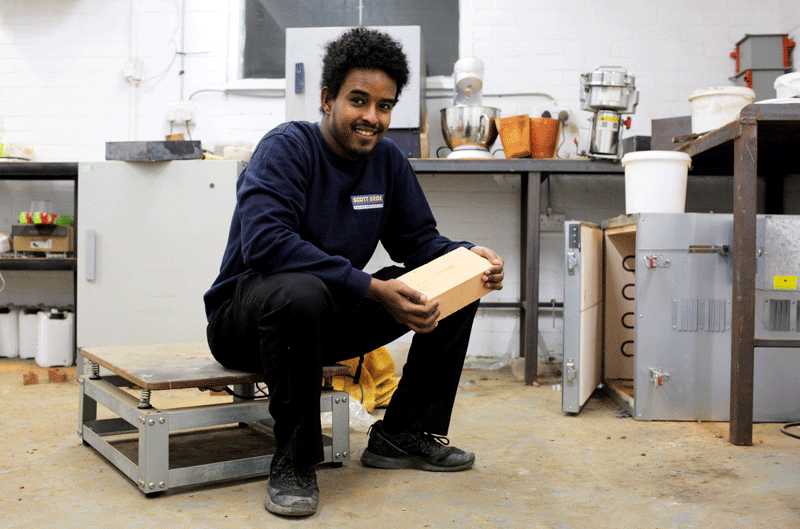Brick prototype from recycled waste
Stockton, UK-based Scott Bros has produced three prototype ‘bricks’ from recycled waste clay.

The company is using fine-grained clay material, or ‘filter cake’ – a by-product from its wash plant which converts construction and excavation waste into high-quality sand and aggregates.
Recycling Innovation Engineer, Feysal Shifa, says, ‘The brick is predominantly made up of the waste filter cake with the introduction of an alkali medium. It is made up of two-thirds filter cake and one-third alkali medium.’
He shares, ‘Waste materials are collected from local construction-related projects within the Teesside region and delivered to our holding facilities, where they are characterised and separated. Key attention is paid to the mixed soils and stones constituents of the waste as they are essentially the source of the filter cake. These are put through the wash plant to produce clean aggregates and soils that are immediately ready for commercial use.
‘However, not everything coming out of the wash plant is of commercial value. Some substances are retained on the belt filter press of the wash plant and form a residual waste product known as filter cake. This sludge, formed by agglomeration of the fine soil particles into a cohesive waste material, is the main ingredient in making the brick.’
Scott Bros has been looking for a use for its filter cake for some time as currently it is used as low-value, BS-certified, pond lining clay or inert engineering fill.
A team at Teesside University, UK, has helped the company to valorise the filter cake material by instigating its activation and geopolymerisation. Geopolymers are made up of atomic chains or networks, much like a plastic, but based on minerals. This technically makes them an inorganic polymer formed by combining an alkali activator with the raw filter cake material. It means its chemistry is rich in aluminium and silica.
To prepare the filter cake for binding, it is modified to optimise moisture content and alkali constituents. This is achieved by thermal treatment. The prepared filter cake is then mechanically blended with an alkali activator to promote dissolution of the aluminate and silicate components, forming a gel-like paste with a consistency resembling that of toothpaste.
Discussing curing at 60°C, Shifa continues, ‘Through a literature review of previous studies on waste-based construction materials rich in alumina, silica and alkaline environment, this temperature provides optimum conditions for bond formation and strength gain. Any higher or lower would result in strength loss or insufficient strength gain.’
Compressive strength testing of the resulting bricks reveals strengths ranging between 20-45N/mm2. Other tests characterise the filter cake and the bound waste product. These include Atterberg Limits tests, pH tests and microstructural analyses, such as scanning electron microscopy with energy-dispersive X-ray spectroscopy and X-ray diffraction.
The firm says further research is now needed to lower production costs and make the bricks commercially viable.
Shifa says, ‘There is potential [for] the filter cake to become a materials supply as there is a constant production line directly from the washing plant operations. To quantify, we currently produce around 100t of filter cake per day.’
He suggests any wastewater treatment company would also benefit and the next steps are to develop a manufacturing factory using a renewable source of heat. Scott Bros hopes to also build a much larger wash plant in South Bank, Middlesbrough, to handle up to 50t of inert material per hour.
Company Director Bob Borthwick adds, ‘We have already been contacted by a major UK housebuilder which is keen to trial our bricks, along with a company in Australia.’

